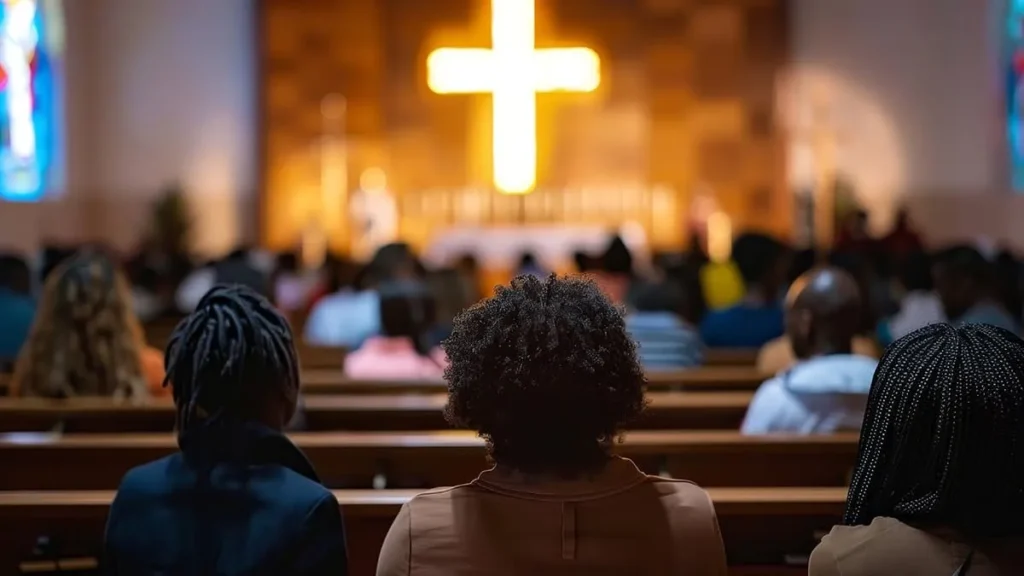
The story of Paul, a 30-year-old former Catholic, reveals what Gen Z thinks of Christianity in Africa today. For him, the Church no longer speaks to his pain. “Going to church is for fools,” he said. “The Church exploits the poor while clergy dine with corrupt politicians.” When reminded of Church schools and hospitals as agents of charity, he replied, “They are too expensive for the poor who built them.” His words may sound bitter, but they echo the silent disappointment of countless young Africans.
Indeed, across Africa today, a restless generation is rising — young Gen-Z neo-traditionalists calling for a return to African religion, culture, and values. To them, Christianity has failed to liberate Africa. Instead, it represents western domination and colonial control disguised as faith. Paul’s tale is not a single story. When I queried a group of young people I met listening to a mixture of pro-African traditional religion, anti-Christian and anti-colonial themed videos on YouTube recently, why they no longer attend Mass, their tone sounded indifferent and dismissive. One of them, Kelechukwu, argued that the Church is a religious brand of neo-colonialism and that the Bible itself is an enslaving text — a book once used to strip Africans of dignity and teach submission. “I respect priests for their knowledge and sacrifice ”, he said, “But I no longer come to Church because it’s all about business and interest, and I haven’t seen anything the Church has done for me”, asked about the charitable and spiritual legacies of the early missionaries, “When the missionaries came to Africa, they had the Bible and we had the land. They said, ‘Let us pray.’ We closed our eyes. When we opened them, we had the Bible and they had the land.”, he quoted—adding that Christianity is the religious wing of Western colonization. To these young voices, that story captures the tragedy of Africa’s spiritual colonization.
Christianity on Trial
The voices of Paul and Kelechi join millions of young Gen Z Africans across the continent who use the internet as a platform to share criticisms against the government and the Church, which is accused of complicity or turning a blind eye to issues of injustice, exploitation, and oppression. Various social media outlets like Facebook, Twitter and TikTok are used by these young people to promote indigenous religion and critique Christianity and colonialism, often calling for decolonization of the African mindset and a return to indigenous religion, culture and values. Some of the posts share the history of missionary connivance, like in the Colonial Congo, as evidence of the Church’s silence and complicity during colonial violence and slavery. In contrast, other posts see the Church as an agent of neo-colonialism because, in many cases today, it is quiet in the face of political corruption. The scandals, clericalism, the deceptions of prosperity gospel often marred by fake promises and miracles, and leadership failures haunting the African Church, which are widely shared on social media by these young people, only reinforce their belief that Christianity’s mask of holiness has been torn off. For them, Christianity has become a scam — a religion that preaches humility to the poor but feasts with the powerful.
A Fusion of Protest, Liberation and Syncretism
Arinze, 35, is a self-acclaimed IPOB member who follows the radio program of Nnamdi Kanu, the detained leader of the Indigenous People of Biafra (IPOB), who merges anti-colonial and anti-Christian rhetoric with pro-Jewish and traditional African spirituality, claiming the Igbos are from Israel and urging a return to ancestral religion and rejecting Christianity as a colonial tool. Asked why he no longer comes to Church, “I can’t leave the religion of my ancestors to worship a white man”, he said, “If Christianity is a true religion, why do Britain and America watch while Nigeria soldiers kill innocent Biafrans seeking self-determination?”. Critics have accused Kanu’s radio Biafra programs of being filled with divisive, inflammatory rhetoric, capable of sowing ethnic divisions. His adoption of Jewish religious symbols, including the wearing of Jewish prayer shawl, which many of his Genz followers adopt, and his leading in Jewish prayer while at the same time promoting African traditional religion has been described by critics as a sign of gross confusion. While others question the sanity of muddling Judaism, African traditional religion, anti-colonial and anti- Christian rhetoric and liberation as a sign of delusion. The fact that young people in the South-East continue to view him as a liberator, freedom fighter, and spiritual leader, and would listen to him more than any other political or religious leader, makes him a person of interest and a force to be reckoned with.
In South Africa, Gugu Ndabezitha, popularly known as Sis. Gugu, a former Catholic, is reviving indigenous spirituality and healing. Her first YouTube video garnered 20,000 views within a week. “We need to unpick the colonial narrative and misconceptions that spirituality in the continent is somehow primitive and uncivilized, ” she revealed to Google Africa. Critics claim that she is chasing clout, suggesting that she is a spiritual healer and clairvoyant. Her personal struggles, which she often shares online, have been described by critics as a means of garnering public sympathy. At the same time, her participation in the South African reality show Big Brother Mzansi House has led others to question her authenticity. Yet, the fact that young people continued to seek her out for spiritual help makes her worth listening to.
A Spiritual Revolt Taking a Dark Turn
Sadly, this spiritual revolt has also taken dark turns. In a materialistic age, some youth now turn to indigenous spirituality for wealth and power. The rise of money rituals, human sacrifice, organ trafficking, and kidnapping for ransom are grim symptoms. In Nigeria, the state of Anambra recently passed ‘the homeland security law’, which, among other things, targets evil native doctors who engage in ritual killing. In Kenya, people with albinism are hunted for human parts believed to bring luck and wealth. A UN independent Human Rights Report, ‘Albinism in Africa’, records over 800 such attacks across 28 African countries since 2006.
The Church’s Response
The Church’s response has largely been reactionary. The Catholic Bishops of Lagos Province recently released a statement, ‘Upsurge of Neo-paganism a Threat to Nigeria’s Moral Fabric’, condemning ritual wealth and internet fraud inspired by false spiritual beliefs. Yet such statements have not answered the deeper question: Why are young people leaving the Church?
Priests and pastors have often suspended, punished or even excommunicated Christians who patronize what they call fetish, idolatrous or indigenous religion.
Even in the very history the Genz anti-Christian uses against the Church lies glaring evidence that Christianity is neither a colonial nor a white man’s religion. The Bible indicates that there were early converts in Libya, Ethiopia, Egypt, and Pontus (Acts 2:14-34) and that Christianity flourished in this region even before it took root in Europe. Christianity reached Africa very early, spreading across North Africa and into the Kingdom of Aksum. Despite the later isolation caused by Islam, it endured for centuries in Nubia and remained alive in Ethiopia.
The missionaries were not always about colonial violence and the Church’s tolerance of slavery. The heroics of lay catechists, who themselves were victims of slavery and European missionary hypocrisy, led an indigenous Church and laid the foundation for an indigenous faith. Their translation of indigenous texts, local liturgy, catechisms in Kikongo, the role of local translator catechists(maestri) and local theological reflections, shows that Africans were not just recipients of white man’s religion but protagonists in shaping Christianity and adapting it to their culture, history and values and allowing it to speak to them.
Time for a Prophetic Turn
What we are witnessing is not just rebellion — it is revelation. It is a generation asking the Church to wake up. Instead of condemnation, the Church must ask: What are the youths really seeking? Do our parishes, homilies, and pastoral actions speak to their political, economic, and spiritual hunger? Why do they find more authenticity in neo-traditional and protest movements than in the pulpit? The time has come for a new evangelization in Africa — one that engages the realities of poverty, injustice, and despair. The Church must reclaim her prophetic and social mission: to speak truth to power, to defend the weak, and to accompany the poor.
The SECAM Vision 2025–2050 document, issued earlier this year in Kigali, offers a path forward. It’s a call for human rights, justice, servant leadership, and spiritual leadership, as well as contextual evangelization, that should guide the Church’s renewal. Legacies of late Archbishop Philip Kpodzro of Togo and late Bishop Raymond-Marie Tchidimbo of Guinea Conakry – both symbols of resistance against oppressive regimes and voices of conscience in their countries; and the wisdom of papal encyclicals like Rerum Novarum (Leo XIII) and Pope Leo XIV’s Delexi Te, provide timeless witnesses and tools for confronting poverty, inequality, and oppression.
Africa needs not an elite, bureaucratic clergy and church, but prophetic pastors who “smell like the sheep,” in Pope Francis’ words — men and women who feel the pain of their people and dare to speak out. From Lagos to Yaoundé, Abidjan, Lomé to Antananarivo, the Church must rise again as the moral conscience of the continent. Like Simon of Cyrene, she must help bear the cross of Africa’s youth — walking with them, bleeding with them, and believing with them.




1 comment
The Church has been turned from its soul occupation of Preaching and providing means of sustaining the hope to exploitative measures where small Christian communities are being used to raise funds for projects of the church and many other practices that require revision from the Catholic Church before it becomes as alien religion